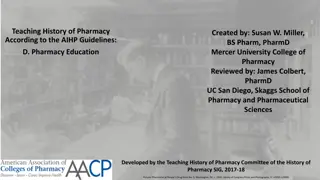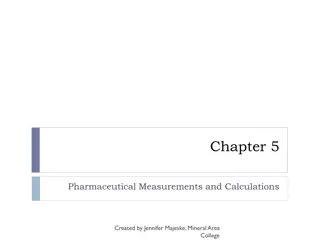Professional Accountability and Codes of Ethics in Pharmacy Practice
The journey of establishing professional accountability and codes of ethics in the pharmacy profession, particularly in Great Britain, is highlighted. The significance of maintaining ethical standards and the emphasis on patient care and safety are underscored through the principles outlined by the Royal Pharmaceutical Society. The evolution of ethical standards and the importance of being held accountable within the profession are discussed, emphasizing the pivotal role pharmacists and pharmacy technicians play in upholding these values.
Download Presentation

Please find below an Image/Link to download the presentation.
The content on the website is provided AS IS for your information and personal use only. It may not be sold, licensed, or shared on other websites without obtaining consent from the author.If you encounter any issues during the download, it is possible that the publisher has removed the file from their server.
You are allowed to download the files provided on this website for personal or commercial use, subject to the condition that they are used lawfully. All files are the property of their respective owners.
The content on the website is provided AS IS for your information and personal use only. It may not be sold, licensed, or shared on other websites without obtaining consent from the author.
E N D
Presentation Transcript
Code of Ethics for Pharmacists Dr. Haider Raheem Mohammad Dr. Haider Raheem Mohammad
Professional accountability and codes of ethics The creation of a professional register is a way of publicly stating that members of the profession claim particular knowledge and expertise that had to be proven to enter the register. Indeed, the derivation of the word profession stems from the Latin professo, a verb meaning to take an oath or make a public declaration. It follows that members of a profession accept and expect to be held accountable by the profession for certain qualities and to be removed from the register if found wanting.
Professional accountability and codes of ethics The pharmacy profession in Great Britain adopted a register in 1933 and the Statutory (disciplinary) Committee first deliberated on a matter of misconduct and fitness to stay on the register in 1936. Nevertheless, the profession did not undertake a formal declaration of its ethical standards until the publication of the first Statement on Matters of Professional Conduct in 1944. This title was changed to the Code of Ethics in 1984 and this title is still used, although the content has been revised every ten years or so. Codes (of ethics or otherwise) generally express an agreed set of rules and standards of conduct expected of a group of individuals. They are as likely to apply to members of a golf club or a trade association as to a profession.
Professional accountability and codes of ethics In 2002, the Professional Associations Research Network examined 52 codes of conduct produced by UK professional associations and published an overview of their content. The research identified a number of common themes underpinning the philosophy of such codes, their structure, language and enforcement.
Code of Ethics for Pharmacists and Pharmacy Technicians of Royal Pharmaceutical Society of Great Britain The Code is founded on seven principles which express the values central to the identity of the pharmacy professions. The seven principles encapsulate what it means to be a registered pharmacist or pharmacy technician. Making these principles part of your professional life will maintain patient safety and public confidence in the professions.
1. Make the care of patients your first concern The care, well-being and safety of patients are at the centre of everyday professional practice. They must be your primary and continuing concern when practising, irrespective of your field of work. Even if you do not have direct contact with patients your actions or behaviour can still impact on their care or safety. E.g. you must provide a proper standard of practice and care to those for whom you provide professional services.
2. Exercise your professional judgement in the interests of patients and the public The need to balance the requirements of individuals with society as a whole and manage competing priorities and obligations is a feature of professional life. Guidelines, targets and financial constraints need to be taken into account, but they must not be allowed to compromise your ability to make an informed professional judgement on what is appropriate for patients in specific situations. E.g. when acting in your professional capacity you must consider and act in the best interests of individual patients and the public.
3. Show respect for others Demonstrating respect for the dignity, views and rights of others is fundamental in forming and maintaining professionally appropriate relationships with patients, their carers, colleagues and other individuals with whom you come into contact with. E.g. in your professional practice you must recognise diversity and respect the cultural differences, values and beliefs of others.
4. Encourage patients to participate in decisions about their care Patients have a right to be involved in decisions about their treatment and care. They should be encouraged to work in partnership with you to manage their healthcare needs. Where patients are not legally capable of making decisions about their care you must seek the authority of persons who are empowered to make decisions on their behalf. E.g. you must work in partnership with patients, their carers and other healthcare professionals to manage the patient s treatment and care. Explain the options available and help individuals to make informed decisions about whether they wish to use particular services or treatment options.
5. competence Develop your professional knowledge and At all stages of your professional working life you must ensure that your knowledge, skills and performance are of a high quality, up to date and relevant to your field of practice. E.g. you must maintain and improve the quality of your work by keeping your knowledge and skills up to date, evidence-based and relevant to your role and responsibilities.
6. Be honest and trustworthy Patients, colleagues and the public at large place their trust in you as a pharmacy professional. You must behave in a way that justifies this trust and maintains the reputation of your profession. E.g. you must uphold public trust and confidence in your profession by acting with honesty and integrity.
7. Take responsibility for your working practices Team working is a key feature of everyday professional practice and requires respect, co-operation and communication with colleagues from your own and other professions. When working as part of a team you remain accountable for your own decisions, behaviour and any work done under your supervision. E.g. you must communicate and work effectively with colleagues from your own and other professions and ensure that both you and those you employ or supervise have sufficient language competence to do this.
Applying the principles It is your responsibility as a pharmacist to apply the principles of the code of ethics to your daily work, whether or not you routinely treat or care for patients. You must be able to show that you are aware of the code and have followed the principles it lays down. You are professionally accountable for your practice. This means that you are answerable for your acts and omissions, regardless of advice or directions from your manager or another professional. You are expected to use your professional judgement in the light of the principles of the code and must be prepared to justify your actions if asked to do so.
Development of the law in relation to pharmacy, medicines and poisons Between 1968 and 1978, the statutes relating to medicines, poisons and drugs were almost entirely repealed and replaced by new legislation. The Medicines Act 1968 now controlled the manufacture and distribution of medicines; the Poisons Act 1972 regulated the sale of non-medicinal poisons, while the Misuse of DrugsAct 1971 dealt with the abuse of drugs. In 1973, the National Health Service Reorganization Act brought about a major revision in the pharmaceutical services of the National Health Service (NHS). A new National Health Service Act in 1977 together with many amending Health ServiceActs now regulate the pharmaceutical services.
Development of the law in relation to pharmacy, medicines and poisons Before the middle of the 19th century, there were no legal restrictions in England on the sale of poisons or drugs, and anyone could describe themselves as a pharmaceutical chemist. Statutory control over sales was first applied to arsenic because, as the preamble to the Arsenic Act 1851 stated, the unrestricted sale of arsenic facilitates the commission of crime. The first statute relating to pharmacy followed the next year. The Pharmacy Act 1852 confirmed the charter of incorporation of the Pharmaceutical Society of Great Britain.
Charles H. La Wall (1871- 1937), Dean Philadelphia Pharmacy (1918-37) President of Pharmaceutical (1918-19), architect of the first modern code of ethics for American pharmacy (1922). of the of and College the American Association
In 1848 the Philadelphia College of Pharmacy promulgated the first American code of ethics for pharmacists. The painting "American Pharmacy Builds Its Foundations" by Robert Thorn shows the artist's conception of the founding of the College in 1821.























